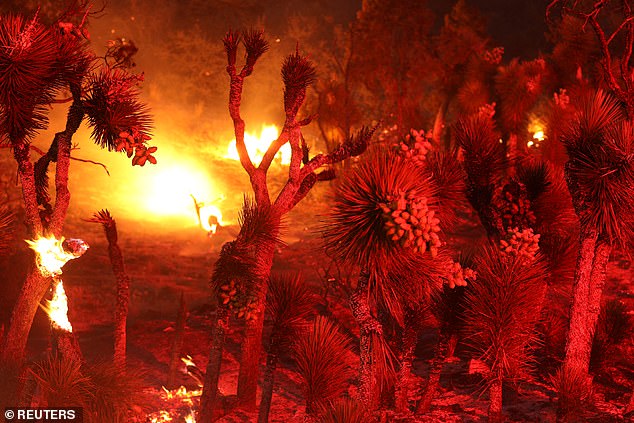UK Wildfires Push Rarest Wildlife To Brink Of Extinction

Table of Contents
The Devastating Impact of Wildfires on UK Habitats
UK wildfires inflict catastrophic damage on vital habitats, leading to irreversible loss of biodiversity. Heathland, peat bogs, and ancient woodlands – ecosystems which support incredibly unique and fragile species – are particularly vulnerable. The intense heat destroys not only the immediate vegetation but also the intricate soil structure, impacting the long-term health of the ecosystem. The consequences are far-reaching:
- Loss of nesting sites for birds: Species like the Dartford Warbler, already a vulnerable species, lose crucial nesting sites in heathland fires, severely impacting their breeding success. The Nightjar, another heathland specialist, faces similar threats.
- Destruction of foraging grounds for mammals: The endangered hazel dormouse, reliant on specific shrubs and trees for food and shelter, sees its habitat decimated by wildfires. Similarly, the rare water vole loses vital foraging grounds along riverbanks destroyed by fire.
- Impact on insect populations: Wildfires devastate insect populations, impacting the entire food chain. Many rare beetles and butterflies rely on specific plants destroyed by the flames. This loss ripples up the ecosystem, affecting everything from birds and reptiles to amphibians.
- Degradation of water sources: Fires pollute waterways with ash and debris, harming aquatic life and reducing the availability of clean drinking water for animals.
- Long-term habitat alteration preventing recovery: Even after the flames die down, the landscape is irrevocably changed. The soil is eroded, making re-growth difficult, and the altered landscape may no longer be suitable for the species it once supported.
Specific Endangered Species Most at Risk
Several endangered species are disproportionately affected by UK wildfires. The intensity and speed of these fires leave little time for animals to escape, leading to direct mortality and habitat destruction.
- The UK's rarest butterfly, the Large Blue: This iconic butterfly relies entirely on specific wild thyme plants for its larvae to feed on. Wildfires destroy these vital food sources, pushing the species even closer to extinction.
- The endangered pine marten: This elusive mammal requires extensive woodland habitat for foraging and shelter. Wildfires fragment this habitat, isolating populations and making them more vulnerable to disease and inbreeding.
- The red squirrel: Although not directly killed by fires, the destruction of woodland habitat reduces their food supply (conifers) and shelter, making them more susceptible to predation and competition from the invasive grey squirrel.
(Include high-quality images of the Large Blue butterfly, pine marten, and red squirrel here)
The Role of Climate Change in Increasing Wildfire Risk
The increasing frequency and intensity of UK wildfires are intrinsically linked to climate change. Rising global temperatures contribute to:
- Rising average temperatures increasing flammability of vegetation: Drier, hotter conditions create tinder-dry landscapes, making them highly susceptible to ignition and rapid fire spread.
- Prolonged dry spells creating ideal conditions for wildfires to spread rapidly: Extended periods without rain dry out vegetation, increasing its flammability.
- Increased frequency of heatwaves making wildlife less resilient: Extreme heat waves stress wildlife populations, reducing their ability to cope with further environmental stressors such as wildfires.
- The resulting feedback loop where wildfires further damage carbon sinks, exacerbating climate change: Burning peatlands release significant amounts of stored carbon into the atmosphere, further contributing to climate change and creating a vicious cycle.
Conservation Efforts and Future Outlook
Conservationists are working tirelessly to mitigate the impact of UK wildfires and protect vulnerable species. However, significant challenges remain:
- Ongoing reforestation and habitat restoration projects: These are crucial for restoring lost habitats, but the process is slow and requires significant funding and resources.
- Breeding programs for critically endangered species: Captive breeding programs are underway for some species, providing a safety net, but these programs are costly and require expertise.
- Community involvement in wildfire prevention and response: Local communities are vital in preventing wildfires through responsible land management and quick response to emerging fires.
- Funding and research initiatives for long-term conservation: Increased investment in research is essential for understanding the long-term impact of wildfires and developing effective conservation strategies.
- Policy changes aimed at reducing wildfire risk: Stronger policies are needed to manage land sustainably, reduce the risk of wildfires, and improve response mechanisms.
Conclusion
UK wildfires pose an unprecedented threat to the nation's rarest wildlife, driving several species to the brink of extinction. The interconnectedness of climate change, habitat loss, and species extinction is starkly evident. The destruction of habitats, the direct mortality of animals, and the disruption of ecological processes have devastating consequences for biodiversity. The urgency of the situation cannot be overstated. The Large Blue butterfly, the pine marten, and the red squirrel, among many others, are facing an existential crisis.
We must act now. Support conservation charities working to protect these precious species, practice responsible behaviour in the countryside to prevent accidental wildfires, advocate for stronger environmental policies, and spread awareness about the devastating effects of UK wildfires. Only through collective effort can we prevent the extinction of these invaluable species and ensure a healthier future for UK biodiversity. The fight to protect the rarest wildlife from the impact of UK wildfires requires ongoing vigilance and commitment.

Featured Posts
-
 Impact Of Jurisdiction On Sentencing The Meg Thee Stallion Case Study
May 13, 2025
Impact Of Jurisdiction On Sentencing The Meg Thee Stallion Case Study
May 13, 2025 -
 Chris And Meg A Wild Summer
May 13, 2025
Chris And Meg A Wild Summer
May 13, 2025 -
 2024 Texas Rangers Season Review Andrew Chafins Performance
May 13, 2025
2024 Texas Rangers Season Review Andrew Chafins Performance
May 13, 2025 -
 Penipuan Telekomunikasi Dan Judi Online Di Myanmar Ancaman Dan Solusi Efektif
May 13, 2025
Penipuan Telekomunikasi Dan Judi Online Di Myanmar Ancaman Dan Solusi Efektif
May 13, 2025 -
 Trumps Plan To Lower Drug Prices A Deep Dive Into The Executive Order
May 13, 2025
Trumps Plan To Lower Drug Prices A Deep Dive Into The Executive Order
May 13, 2025
